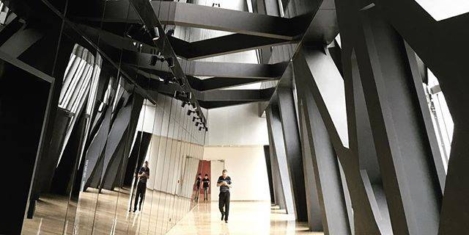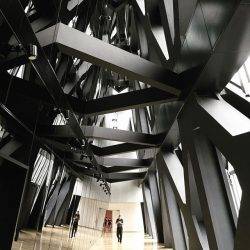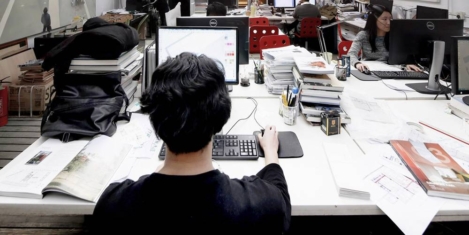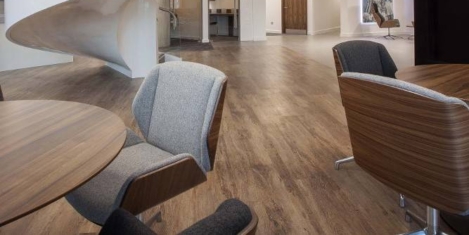January 8, 2018
January 2, 2018
Seven stories that got us thinking over the holiday season
by Mark Eltringham • Architecture, Facilities management, Features, Property, Technology, Workplace design
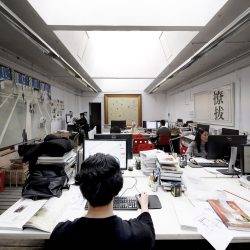 Around the world in 80 architecture offices
Around the world in 80 architecture offices
If work dominated your every moment would life be worth living?
Ten years in and nobody has come up with a use for blockchain
The case against digital transformation
All the creepy, crazy and amazing things that happened in AI in 2017
The tyranny of competence: why it is bad for us to be ‘good enough’
December 28, 2017
The most read workplace stories from the last twelve months
by Mark Eltringham • Architecture, Facilities management, Features, Technology, Workplace, Workplace design
One of the greatest joys of online publishing is the opportunity it offers to reflect on the demonstrable preoccupations and interests of an informed audience. We can see what professionals see as the most important issues they face by what they read in the UK’s most widely read publication in its field. It’s especially heartening to see that those do not include the usual glib misdirections about Millennials, gimmicky office design, robots, open plan and ‘trends’ that have been more or less commonplace for years. We can leave those to others. Instead you have been seeking out stories that challenge the lazy mainstream narratives, reflect the reality of the endlessly shifting landscape of work, understand the challenges involved and retain a focus on the human beings at the centre of it all. So, here are the ten most read pieces from Workplace Insight published over the past 365 days. (more…)
December 22, 2017
Seven workplace design and management stories that you must read this week
by Mark Eltringham • Features, Property, Technology, Workplace design
The jingle jangle of work non-work balance
Productive healthy ageing and musculoskeletal health
Understanding modern work in an age of insecurity
The death of employee engagement or a happy ending?
Is the era of management over?
The paradox of choice in the workplace
Ten workplace meta-trends for 2018 (really)
December 8, 2017
Seven workplace stories that have caught our attention this week
by Mark Eltringham • Features, Flexible working, Technology, Workplace, Workplace design
Microsoft’s blueprint for its new headquarters
How work changed to make us all passionate quitters
Workplaces send subconscious signals to people
Ten workplace meta-trends for 2018
Why are we convinced robots will take our jobs despite the evidence?
One in seven employers won’t hire a woman who might have children
The real risk of automation is boredom
December 1, 2017
Seven workplace stories that have made us stop and think this week
by Mark Eltringham • Features, Technology, Workplace, Workplace design
Why cities are full of uncomfortable benches
Regulating AI before we reach the tech singularity
What you need to know about Germany’s plans to scrap the 8 hour day
As tech firms mature, so do their headquarters
Managers aren’t doing enough to prepare staff for the future
How the sandwich consumed Britain
A robot has passed a medical licencing exam
November 24, 2017
White Paper: intuitive design and the changing face of workplace interactions
by Oliver Ronald • Briefing, Features, Premium Content, Workplace design
In his famous 1988 book The Design of Everyday Things, the cognitive scientist Donald Norman suggests that the way we interact with objects and our surroundings is determined almost entirely by their design. People cannot be the primary reason things succeed or fail, because they are constant, while the design of the object itself is the variable. People can expect to learn how to use things better, but without an underlying people-centric and intuitive approach to design, the design will fail to some degree or other. He concludes that the designer should focus their attention on the interaction between people and the design of objects and surroundings. This principle becomes more relevant with each passing day, as the number of interactions we have with designed objects increases. This is most obvious with regard to our interactions with technology, but it is also apparent across our entire lives.
November 24, 2017
It’s just life now: Debra Ward in conversation with Mark Eltringham
by Mark Eltringham • Facilities management, Features, Podcasts, Property, Technology, Workplace design
There is currently a great deal of talk about the way people experience the workplace. It is a subject linked to the changing nature of work but also a growing awareness that the old demarcations of time and place are falling, and with them the demarcations between the workplace professions. This subject may be topical but it has been a long term preoccupation for today’s guest on the podcast Debra Ward. Earlier this year Debra joined JLL in the new role of Strategy & Growth Director and one of her first aims has been to focus on the firm’s approach to human experience. This is encapsulated in a major global report on the subject but it’s one that Debra has always championed in here previous roles with MITIE, Macro and Condeco. Debra is forthright, informed, bright and passionate. Everything you need in a podcast in fact.
November 23, 2017
The workplace sector responds to the 2017 UK Autumn Budget
by Mark Eltringham • Architecture, Environment, Features, Property, Technology
Yesterday, the Chancellor Philip Hammond announced the details of the UK government’s latest budget. While Brexit inevitably cast its shadow over the whole thing, there were a number of announcements relevant to the workplace, construction, tech and built environment sectors, many of which have been broadly welcomed by commentators, industry bodies and experts. Among the announcements in the budget were new plans for infrastructure and planning, skills and training, the environment, productivity, AI and regional development.
November 21, 2017
The missing LINC between the office and the future of work
by Mark Eltringham • Features, Flexible working, Technology, Workplace design
There is a theory that if you want to know how the economy is doing, you ask a taxi driver. The basis for this idea is that they are the first to know when money is getting tight, because people make more use of buses and tubes. In a similar way, one of the best ways of gauging workplace trends is to ask an office furniture company. They’ve always functioned in a fiercely competitive market, but are also the first to notice an economic downturn or a shift in the structure of their markets.
November 17, 2017
Seven stories about people, places and technology we’ve been reading this week
by Mark Eltringham • AI, Features, Technology, Workplace, Workplace design
 How to navigate beyond sustainability buzzwords
How to navigate beyond sustainability buzzwords
The communist party offices around the world
Hawking’s fear that AI may replace humans altogether
Tech giants are transforming Sydney’s business district
How AI will transform the employee experience
Promotion improves men’s job satisfaction but not women’s
Why we value physical objects over digital
November 15, 2017
The contribution of personality to the performance of agile workers
by John Eary • Features, Flexible working
The introduction of agile working into organisations has typically focussed on the workstyles of different job roles, but has tended to treat the jobholders within these groups in the same way. The successful introduction of new ways of working clearly relies on the willingness of the people occupying the job roles to embrace new ways of working; yet there has been little investigation of the needs of agile workers with different personality types beyond looking at the needs of extroverts and introverts. These studies have tended to focus on the workplace; for example, the Cushman Wakefield Workplace Programme briefing paper examines how organisations can accommodate the needs of extroverts and introverts working together in the workplace. However, using OCEAN personality profiles, Nigel Oseland found that different personality types have different preferences, which in turn are likely to affect their performance at work.







